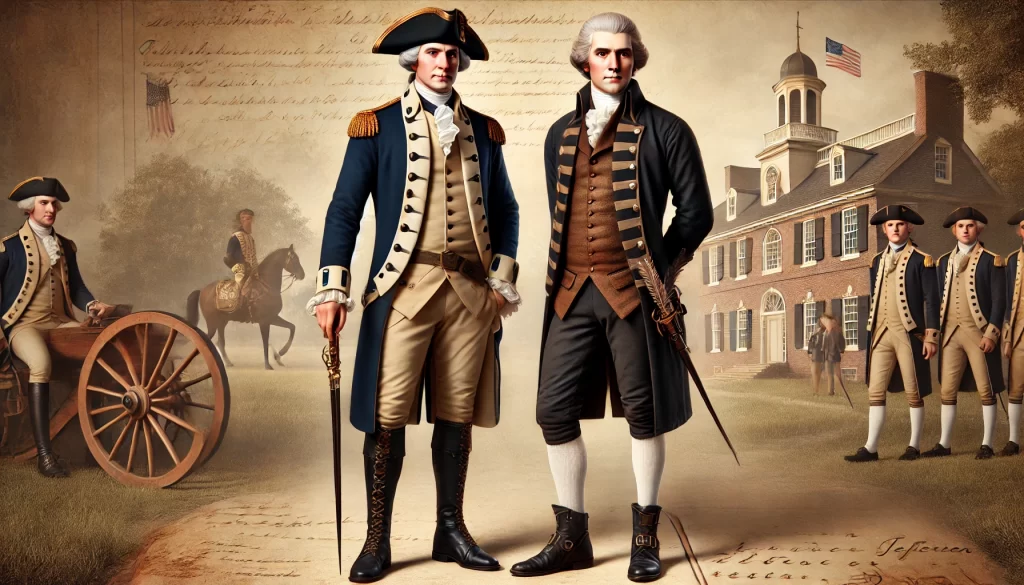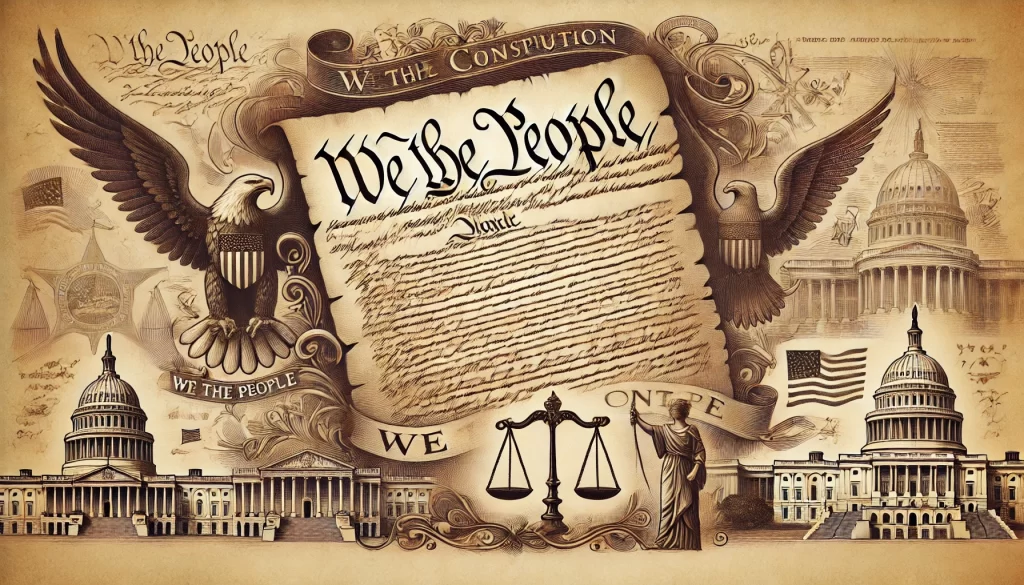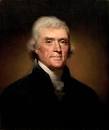
In considering what George Washington and Thomas Jefferson might think of today’s political situation, it’s tempting to view their perspectives through the lens of nostalgia, believing that the founders had an idealistic vision that, if followed, would have prevented many modern problems. It’s impossible of course to know what they may have thought about our current environment. Certainly, such things as a 24-hour news cycle on cable television and social media would have been beyond their comprehension. While both men lived in a vastly different era, their writings and philosophies give us a sense of how they might respond to the polarization and tensions we witness today.
George Washington: A Warning Against Partisanship
George Washington was deeply concerned about the rise of factions in the United States. (Political parties as such were unknown at the beginning of our republic.) In his famous Farewell Address in 1796, he warned that factions could lead to division and weaken the unity of the country. Washington was worried that faction (party) loyalty would surpass loyalty to the nation, creating conflict between groups and impairing the ability of government to function for the common good. He feared that excessive partisanship would “distract the public councils and enfeeble the public administration,” leaving the nation vulnerable to foreign influence and internal discord.
If Washington could observe today’s political environment, he likely would be saddened by the partisanship which dominates political discourse. The gridlock, belligerent rhetoric, and divisiveness we experience today demonstrate the appropriateness of his concern. Washington would likely advocate for a return to greater civility, urging Americans to focus on the common good and to set aside factionalism for the sake of national unity. While political parties have become integral to our system, Washington would likely still press for cooperation, mutual respect, and compromise among all groups.
Thomas Jefferson: Liberty, Democracy, and the People’s Role
Thomas Jefferson, while more supportive of political parties than Washington, had his own complex views about governance. Jefferson believed in the power of the people to govern themselves and was a passionate advocate for liberty, democracy, and decentralization. He distrusted concentrated power, whether in government, or economic institutions, and feared that it could lead to tyranny. Jefferson was famously a champion of agrarianism and believed that widespread participation in the democratic process was the best defense against corruption and the loss of liberty.
Jefferson, while a proponent of states’ rights and individual liberties, might view polarization as a threat to democratic ideals if it stifles dialogue and compromise. He believed in the potential for free men to govern wisely, but would caution against the erosion of civil discourse that might follow the rise of extreme factionalism
Faced with the highly charged political debates of today, Jefferson would likely express concern over the increasing centralization of power in government, banks, and large corporations. He would, without doubt, be troubled by the outsized influence of money in politics.
Jefferson was also a firm believer in education as a cornerstone of democracy; he would stress the importance of an informed electorate, particularly in an age where misinformation can spread rapidly.
However, Jefferson was no stranger to political conflict, having played a central role in the fiercely partisan battles of his time. He understood the value of vigorous debate but would probably urge that such debate remain focused on the core democratic principles of liberty, justice, and equality rather than devolving into personal attacks.
Media and Civil Discourse
Of course, it is impossible to know what Washington and Jefferson would think about the current role of media, particularly social media which would be beyond anything in their experience. Washington felt strongly aggrieved by the attacks upon him in the newspapers of the time. He felt unfair attacks would undermine national unity. Jefferson, on the other hand, was a strong proponent of freedom of the press. He was also very adept at the use of newspapers to accomplish political means.
However, it is likely that both would caution against the dangers of misinformation and partisan bias to distort public perception. Most likely both would emphasize the need for a responsible press that distinguishes between fact and opinion and supports a healthy democracy. Both would be opposed to using false or misleading statements to influence the public.
Unity and Civic Responsibility
Despite their differences, both Washington and Jefferson would likely agree on one thing: the importance of unity and civic responsibility. They envisioned a country where citizens were deeply involved in a participatory government, contributing not just with votes but with informed, constructive dialogue. Washington would call for a spirit of national unity above party lines, while Jefferson would insist that the preservation of liberty relies on active and informed participation from the public.
Both founders would encourage a healthier, more cooperative political environment, one where differences are respected and not allowed to fracture the country. They would likely see today’s polarization as a threat to the very ideals they fought to establish, and both would urge Americans to remember their shared values.
Conclusion
In short, George Washington and Thomas Jefferson, while men of their own time, had insights that are still relevant today. Neither man could have predicted the exact nature of modern politics, but their wisdom offers enduring guidance: political disagreements must not undermine the unity, liberty, and civic responsibility that are the foundation of the American experiment. We owe it to them not to lose the promise of the American Revolution.



What Would Jefferson Think About Inserting Religion Into Public Education?
By John Turley
On January 13, 2025
In Commentary, History
Jefferson on Religion
Thomas Jefferson had strong views on the separation of church and state, and based on his writings, it’s likely that he would have opposed any attempt to inject religion into public education. Jefferson’s views on religion were deeply influenced by Enlightenment principles, particularly the era’s emphasis on reason, skepticism of traditional authority, and commitment to individual liberty.
While Jefferson respected personal religious beliefs, he believed religion should remain a private matter, free from government influence. His 1786 Virginia Statute for Religious Freedom declared it immoral to compel anyone to support or participate in religious activities, emphasizing individual choice in matters of faith. This stance guided his actions, including the disestablishment of the Anglican Church as the official church of Virginia after the Revolution.
He famously wrote about the need for a “wall of separation between Church & State” in his 1802 letter to the Danbury Baptist Association. This idea became one of the foundational principles behind the First Amendment’s protection of religious liberty.
Although Jefferson was not opposed to religious belief, he supported individual freedom of conscience and he was adamant that religion should be a personal matter, not one enforced, promoted, or influenced by the government.
Religion in Education
When it came to education, Jefferson was passionate about public schooling and saw it as essential to maintaining a democratic society. He believed in the importance of a secular education system that promoted knowledge and reasoning. Jefferson envisioned public education as a way to cultivate informed citizens who could participate in self-governance.
Jefferson’s University of Virginia reflected these ideals, excluding religious instruction and ensuring a secular educational environment. He insisted that religion be studied alongside philosophy and ethics, rather than as a doctrinal subject.
If Jefferson were to assess attempts to inject religion into public education today, it’s reasonable to assume he would view such efforts as a violation of the principles of religious freedom he worked to establish. Jefferson would likely argue that public education, funded by taxpayer dollars and serving people of diverse religious backgrounds, should remain secular to respect the individual rights of all citizens. For him, blending government and religion risked infringing on personal freedoms and undermining the equality of all citizens under the law.
He would probably agree with later interpretations of the Constitution, such as Supreme Court rulings that have affirmed the separation of church and state in the context of public schools. These decisions typically uphold the principle that government institutions, including public schools, should not promote or endorse any particular religion.
Thomas Jefferson’s views on religious freedom, the separation of church and state, and public education suggest that he would strongly oppose any attempt to inject religion into public education. He believed that the role of public schools was to educate citizens in a way that fosters critical thinking, civic engagement, and respect for individual liberties, including the right to practice any religion or none at all. For Jefferson, keeping religion out of public institutions was essential to preserving a free and diverse society.
Jefferson’s unwavering commitment to individual liberty and reason over dogma continues to resonate, emphasizing the enduring value of secular education in fostering democratic principles.